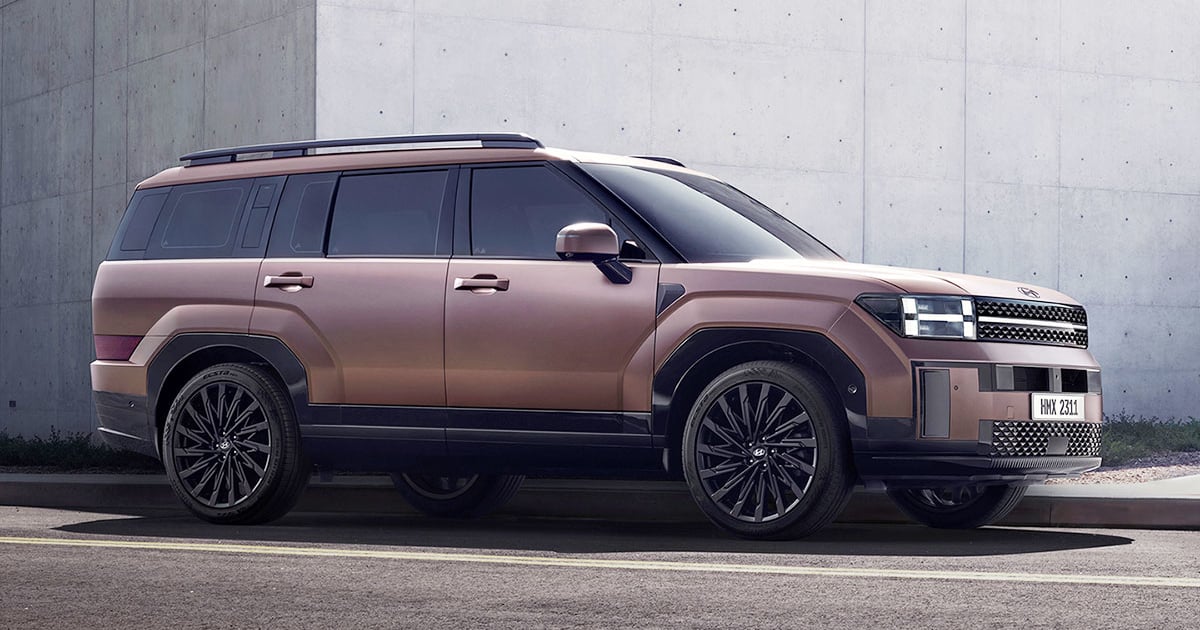
Hyundai’s fifth-generation Santa Fe will offer a more spacious interior, new convenience and safety technology and wildly different styling when it goes on sale in the first half of 2024. While it seems to have more of everything, glaringly absent for U.S. customers is a plug-in variant to complement gasoline and hybrid counterparts.
The automaker revealed the midsize crossover in Santa Fe, N.M., late last month ahead of its North American debut at the 2023 Los Angeles Auto Show in November.
Last year, the Santa Fe was Hyundai’s No. 2 seller behind the Tucson, and has dropped to No. 3 this year behind the Tucson and Elantra, though sales are up 6.4 percent to 71,754 through July.
The latest North American-bound Santa Fe will offer two powertrains: a turbocharged 2.5-liter engine with an estimated 277 hp and a turbocharged 1.6-liter hybrid that could deliver 177 hp.
That’s one fewer powertrain option on the menu. The current Santa Fe offers a gasoline, conventional hybrid and plug-in hybrid variants. Only the hybrid and a plug-in hybrid, with the same turbo 1.6-liter engine, will be offered in Europe.
A Hyundai spokesperson declined to say why the automaker is dropping the plug-in hybrid variant. It’s possible the PHEV has not caught traction with U.S. consumers. According to Hyundai, the Santa Fe plug-in accounted for only 2.5 percent of overall sales this year. The hybrid variant accounts for 15 percent of total sales this year.
The Santa Fe has been completely recast from a jellybean family hauler to a boxy adventuremobile. The decision, Hyundai says, derived from “big data” that revealed strong consumer interest in lifestyle trends such as “camping and gear-intensive adventures.”
The new Defender-esque profile, including a short overhang and giant 21-inch wheels, exudes a more modern vibe. The interior layout is designed around a wider tailgate that Hyundai says caters to both urban and active lifestyles.
The enlarged tailgate is functional for everyday cargo hauling, but Hyundai envisions it will double as a space to lounge or socialize while parked in remote destinations. A handle on the exterior of the C-pillar gives passengers easier access to the roof, maximizing the Santa Fe’s utility for rack loading or — depending on its static roof weight capacity — roof camping,
A 2-inch longer wheelbase helped increase second- and third-row legroom slightly. The biggest improvement, reflecting the boxier roofline, is in the third row, where headroom increases by 2.7 inches to 37.7 inches. The third-row seat also sits 1 inch higher off the floor and can recline 10 degrees, more than the outgoing model.
The cargo space behind the third row is expected to gain around 7 cubic feet compared with the current Santa Fe, which offers 18 cubic feet.
In addition to a panoramic curved display connecting the 12.3-inch digital instrument cluster and infotainment screen, the cockpit offers a UV-C sterilization tray atop the glove compartment to clean dirty, high-touch items such as electronic devices and wallets. The center console also can be opened from the front and rear, giving access to back-row passengers.
Over-the-air updates will let drivers bypass service visits, and Hyundai’s Digital Key 2 will enable access and start functions via smartphone.
The Santa Fe will offer the current versions of Hyundai’s advanced safety technology, including forward-collision assist and lane-following assist. A new driver attention warning provides alerts to tired or distracted drivers, and a driver monitoring system analyzes drivers vital signs. Navigation-based cruise control and Hyundai’s Highway Driving Assist, a combination of adaptive cruise control and lane centering, also will be available.
Hyundai did not disclose details on trim levels, but said North American specs will be released alongside the L.A. auto show reveal. It’s likely the higher-end Calligraphy trim will be part of the revamped lineup as well as an XRT package that offers additional off-roading functionality and hardware.